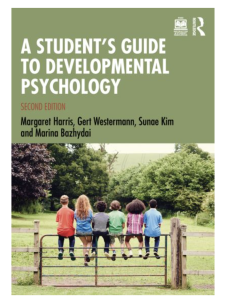
Marina co-authors the second edition of the Student’s Guide to Developmental Psychology textbook designed for undergraduate psychology students.
Exploring development of active social learning in knowledge transfer: information-seeking, curiosity, creativity, and information transmission

Marina co-authors the second edition of the Student’s Guide to Developmental Psychology textbook designed for undergraduate psychology students.
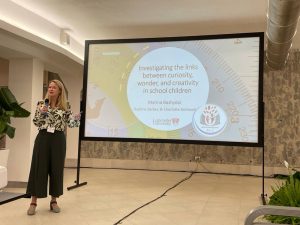 Marina presented the work from the Wonder in the Classrooms project investigating the links between curiosity, wonder and creativity in school children at the annual Marconi Institute for Creativity conference held in Sardinia, Italy.
Marina presented the work from the Wonder in the Classrooms project investigating the links between curiosity, wonder and creativity in school children at the annual Marconi Institute for Creativity conference held in Sardinia, Italy.
Didar and Marina presented at the Cultural Evolution Society conference held this year in Durham, UK. The conference attracts researchers across psychology, animal studies, anthropology, archaeology, economics and sociology fields – all interested in understanding the phenomenon of culture and cultural transmission.
Marina and Didar presented their work on children’s information transmission in infants, toddlers and middle school children.
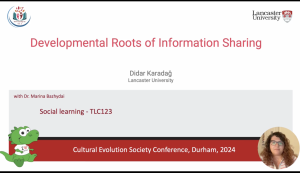
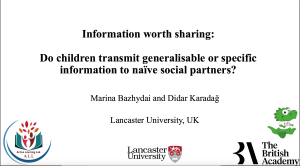
We are off to a great start of the 5- year project to develop a new battery of measures of curiosity for school children! The project is run by Marina as PI and Dr Lily FitzGibbon of Stirling University as Co-I, with Dr Mathilde Prenevost leading the work as a postdoctoral researcher.
This project is funded by the Leverhulme Trust Research Project Grant and it aims to synthesize the theoretical and methodological approaches to curiosity in childhood and use this integrative perspective to systematically address the paucity and heterogeneity of psychological measurements of curiosity in school age (7-11 year old) children. The resulting validated multidimensional assessment battery will be made available for use by researchers and educators. Longitudinal studies will be undertaken to investigate the relationship between different facets of curiosity with children’s academic achievement and psychological well-being outcomes.
The aims and aspirations of the project are summarised in this news article.
The Lancaster Evaluation Group (LEG) are a cross-institutional and interdisciplinary team of researchers and practitioners based at Lancaster University, who have come together through a common interest in evaluative practice https://lancasterevaluationgroup.uk/. Marina co-founded the group with the kick-off Cross-Faculty Catalyst fund awarded by Lancaster University to help develop rigorous evaluation tools, in particular for the education section. The group has led a series of workshops and seminars which can be accessed by joining the team: https://lancasterevaluationgroup.uk/leg-blog
Congratulations to Malcolm on his first authored publication from his PhD – a completed Registered Report now available at the Royal Society Open Science! It’s title is: Does implicit mentalizing involve the representation of others’ mental state content? Examining domain-specificity with an adapted Joint Simon task.
Marina co-authored two publications as part of the ManyManys network aiming to develop cross-species cognitive tasks and approaches to better understand cognitive development. The papers are available here: Challenges and Promises of Big Team Comparative Cognition and Comparative Cognition Needs Big Team Science: How Large-Scale Collaborations Will Unlock the Future of the Field.
Marina, Elena and Didar presented at the International Congress of Infant Studies held in Glasgow this year. Elena and Didar presented several posters on their research from PhD work. Elena and Marina also presented two research studies on infant curiosity in the organised symposium: In the driver’s seat of development.
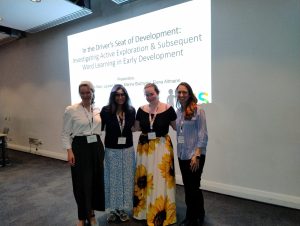
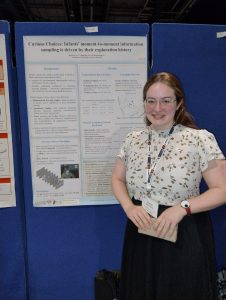
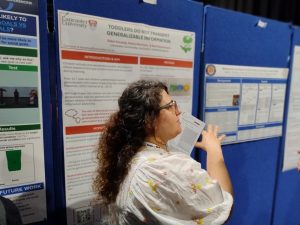
Marina has been working with the Morecambe Bay Curriculum (MBC) to create school resources highlighting sustainability, nature-based and place-based learning. A news article outlining this work is available here.
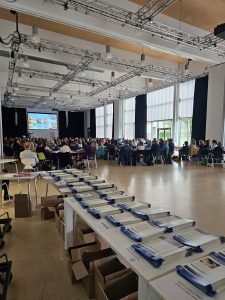
The resources are available through free MBC membership – you can view the examples and sign up here: https://www.lancaster.ac.uk/morecambe-bay-curriculum/resources/
The first phase of the project culminated in a full-day conference on July 5, 2024. Marina participated in the panel discussion: Linking sustainability and place into the curriculum: Panel Discussion between teachers and academics focused on these themes, and led a teacher-focused workshop, entitled: Promoting children’s curiosity, wonder and creativity through engagement with nature – evidence from psychological science and innovative education.
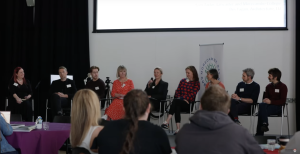
Didar Karadag and Elena Altmann completed their respective PhDs, passing their vivas with flying colours. We wish them exciting new adventures in their new post-doctoral roles!